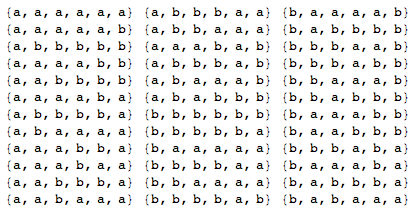Module[{full, a5, b5, excl},
full = Tuples[{a, b}, 10];
a5 = Cases[full, {___, a, a, a, a, a, ___}];
b5 = Cases[full, {___, b, b, b, b, b, ___}];
excl = Cases[Union[a5, b5], Except[{a, a, a, a, a, b, b, b, b, b}]];
Cases[excl, Except[{b, b, b, b, b, a, a, a, a, a}]]]
(*{{a, a, a, a, a, a, a, a, a, a}, {a, a, a, a, a, a, a, a, a, b},
{<<10>>}, {<<10>>}, {<<10>>}, {<<10>>}, {<<10>>}, {<<10>>}, {<<10>>}, \
{<<10>>}, {<<10>>}, {<<10>>}, {<<10>>}, {<<10>>}, {<<10>>}, {<<10>>}, \
{<<10>>}, {<<10>>}, {<<10>>}, {<<10>>}, {<<10>>}, {<<10>>}, {<<10>>}, \
{<<10>>}, {<<10>>}, {<<10>>}, {<<10>>}, {<<10>>}, {<<10>>}, {<<10>>}, \
{<<10>>}, {<<10>>}, {<<10>>}, {<<10>>}, {<<10>>}, {<<10>>}, {<<10>>}, \
{<<10>>}, {<<10>>}, {<<10>>}, {<<10>>}, {<<10>>}, {<<10>>}, {<<10>>}, \
{<<10>>}, {<<10>>}, {<<10>>}, {<<10>>}, {<<10>>}, {<<10>>}, {<<10>>}, \
{<<10>>}, {<<10>>}, {<<10>>}, {<<10>>}, {<<10>>}, {<<10>>}, {<<10>>}, \
{<<10>>}, {<<10>>}, {<<10>>}, {<<10>>}, {<<10>>}, {<<10>>}, {<<10>>}, \
{<<10>>}, {<<10>>}, {<<10>>}, {<<10>>}, {<<10>>}, {<<10>>}, {<<10>>}, \
{<<10>>}, {<<10>>}, {<<10>>}, {<<10>>}, {<<10>>}, {<<10>>}, {<<10>>}, \
{<<10>>}, {<<10>>}, {<<10>>}, {<<10>>}, {<<10>>}, {<<10>>}, {<<10>>}, \
{<<10>>}, {<<10>>}, {<<10>>}, {<<10>>}, {<<10>>}, {<<10>>}, {<<10>>}, \
{<<10>>}, {<<10>>}, {<<10>>}, {<<10>>}, {<<10>>}, {<<10>>}, {<<10>>}, \
{<<10>>}, {<<10>>}, {<<10>>}, {<<10>>}, {<<10>>}, {<<10>>}, {<<10>>}, \
{<<10>>}, {<<10>>}, {<<10>>}, {<<10>>}, {<<10>>}, {<<10>>}, {<<10>>}, \
{<<10>>}, {<<10>>}, {<<10>>}, {<<10>>}, {<<10>>}, {<<10>>}, {<<10>>}, \
{<<10>>}, {<<10>>}, {<<10>>}, {<<10>>}, {<<10>>}, {<<10>>}, {<<10>>}, \
{<<10>>}, {<<10>>}, {<<10>>}, {<<10>>}, {<<10>>}, {<<10>>}, {<<10>>}, \
{<<10>>}, {<<10>>}, {<<10>>}, {<<10>>}, {<<10>>}, {<<10>>}, {<<10>>}, \
{<<10>>}, {<<10>>}, {<<10>>}, {<<10>>}, {<<10>>}, {<<10>>}, {<<10>>}, \
{<<10>>}, {<<10>>}, {<<10>>}, {<<10>>}, {<<10>>}, {<<10>>}, {<<10>>}, \
{<<10>>}, {<<10>>}, {<<10>>}, {<<10>>}, {<<10>>}, {<<10>>}, {<<10>>}, \
{<<10>>}, {<<10>>}, {<<10>>}, {<<10>>}, {<<10>>}, {<<10>>}, {<<10>>}, \
{<<10>>}, {<<10>>}, {<<10>>}, {<<10>>}, {<<10>>}, {<<10>>}, {<<10>>}, \
{<<10>>}, {<<10>>}, {<<10>>}, {<<10>>}, {<<10>>}, {<<10>>}, {<<10>>}, \
{<<10>>}, {<<10>>}, {<<10>>}, {<<10>>}, {<<10>>}, {<<10>>}, {<<10>>}, \
{<<10>>}, {<<10>>}, {<<10>>}, {<<10>>}, {<<10>>}, {<<10>>}, {<<10>>}, \
{<<10>>}, {<<10>>}, {<<10>>}, {<<10>>}, {<<10>>}, {<<10>>}, {<<10>>}, \
{<<10>>}, {<<10>>}, {<<10>>}, {<<10>>}, {<<10>>}, {<<10>>}, {<<10>>}, \
{<<10>>}, {<<10>>}, {<<10>>}, {<<10>>}, {<<10>>}, {<<10>>}, {<<10>>}}*)


